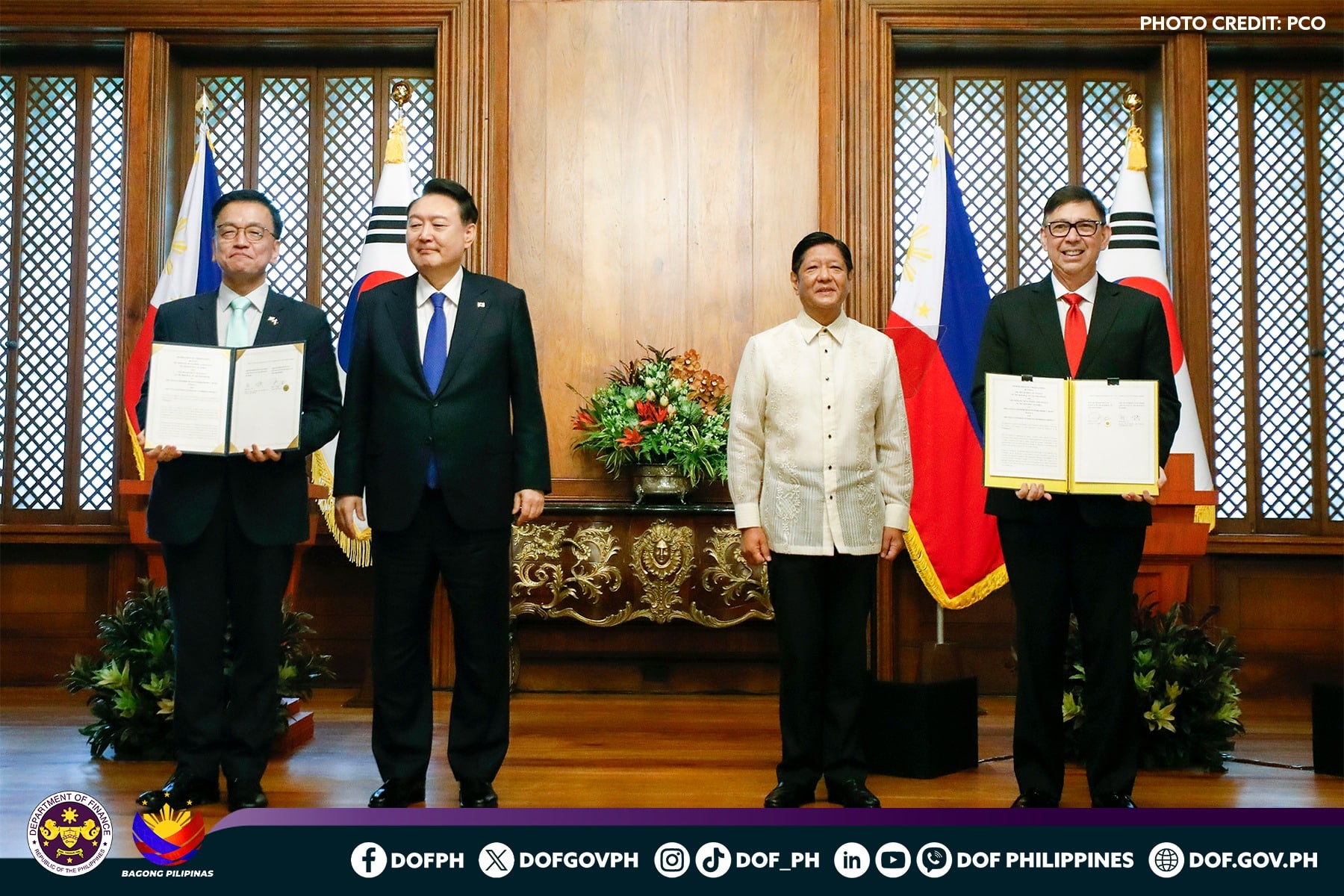Philippines, South Korea seal deals for 3 big infra projects

INFRASTRUCTURE FINANCING. Korea’s Deputy Prime Minister and Minister of Economy and Finance Choi Sang-mok (left) and Finance Secretary Ralph Recto (right) pose for a photo during the ceremonial exchange of agreements in Malacañang Palace on Oct. 7, 2024. The signing was witnessed by President Ferdinand R. Marcos Jr. (2nd from right) and South Korean President Yoon Suk Yeol (2nd from left). – The Philippines and South Korea recently signed agreements for the financing of three big infrastructure projects. | PHOTO: Official Facebook page of DOF
MANILA, Philippines — Finance Secretary Ralph Recto and Korea’s Deputy Prime Minister and Minister of Economy and Finance Choi Sang-mok recently signed agreements for the financing of three big infrastructure projects that will enhance mobility and support economic development in Luzon and Visayas.
In a statement on Wednesday, the DOF said the agreements were signed in Malacañang Palace on Oct. 7 and was witnessed by President Ferdinand Marcos Jr. and South Korean President Yoon Suk Yeol, who was on a state visit to the Philippines.
Among the projects sealed was the P6.34 billion financing agreement for the Samar Pacific Coastal Road II Project, supported by the Export-Import Bank of Korea-Economic Development Cooperation Fund (KEXIM-EDCF).
The project aims to provide a seamless connection for people and goods being transported between Laoang Island and Samar mainland.
It comprises two marine bridges – the Laoang II Bridge and Calamotan Bridge – and the improvement of 15.01 km of existing roads.
Once completed in 2029, the project will reduce travel time from Laoang to Palapag in Northern Samar to 19 minutes from the current 65 minutes.
The DOF said a memorandum of understanding (MOU) was also signed and exchanged for the Laguna Lakeshore Road Network Project Phase 1 (Stage 1) and the Panay-Guimaras-Negros Island Bridges Project.
The MOU serves as a document for the cooperation between the two governments relating to the prospective financing of the two projects.
READ: Philippines, South Korea boost partnership, ink new cooperation pacts
With a total project cost of P181.03 billion, Phase I of the proposed Laguna Lakeshore Road Network Project covers a 37.6-km. viaduct and embankment from Lower Bicutan, Taguig City to Calamba, Laguna.
The amount will also be used to construct eight interchanges proposed to connect municipal boundaries to the nearest public road along Lower Bicutan, Sucat, Alabang, Tunasan, San Pedro/Biñan, Santa Rosa, Cabuyao, and Calamba.
Once completed in 2028, the project will reduce travel time from Filinvest to Lower Bicutan to just 13.7 minutes from 33.5 minutes.
The DOF said KEXIM-EDCF would support Stage 1 of the project amounting to about P50.61 billion, with co-financing from the Asian Development Bank and the Asian Infrastructure Investment Bank.
The inter-island bridges project in Western Visayas, meanwhile, involves the construction of two sea-crossing, four-lane bridges spanning 32.47 km. combined, including connecting roads and interchanges, which will link the islands of Panay, Guimaras, and Negros.
Once the interlink bridges are completed in 2031, the travel time of commuters, motorists, and transport of goods from Panay to Negros Islands through ferries or Ro-Ro (roll-on/roll of) will be shortened from 3 hours to 4 hours to just less than 1 hour.
READ: South Korea eyeing to finance housing project in New Clark City
With a total project cost of P187.54 billion, the KEXIM-EDCF is financing the conduct of the Engineering Service or Detailed Engineering Design for the project under a P3.21 billion financing signed on April 10, 2022.
The Detailed Engineering Design is expected to be completed in 2025.
“These projects are a testament to the strong friendship between the Philippines and South Korea. Beyond enhancing mobility, they will create jobs, spur businesses, boost incomes, and uplift Filipino lives, helping reduce poverty, especially in Luzon and Visayas,” Recto said during the ceremonial exchange of agreements for the projects.
South Korea is the Philippines’ sixth largest official development assistance partner with loan and grant commitments amounting to about USD958.11 million or about P54.33 billion. (PNA)